As a hiring manager, the need to fill a data entry clerk position often arises when your company's data management tasks become too overwhelming for your existing team. Companies sometimes struggle to pinpoint the right skills and qualifications in candidates, leading to inefficient hiring processes. It's important to focus on accuracy, attention to detail, and familiarity with data management software while hiring a data entry clerk.
In this article, we'll discuss why hiring data entry clerks is beneficial, the skills and qualifications to look for, and the best practices for conducting interviews. You'll also find insights on platforms to find candidates and how to craft a compelling job description. For more resources, check out our Data Entry Clerk Interview Questions.
Table of contents
Why hire a Data Entry Clerk?
Data entry clerks play a key role in maintaining accurate and up-to-date information for businesses. They help tackle issues like backlogged paperwork, disorganized digital files, or inconsistent data across systems. For example, a growing e-commerce company might need a data entry clerk to input product details, update inventory, and ensure customer information is correctly recorded.
Consider hiring a data entry clerk when:
- Your team spends too much time on repetitive data tasks
- You notice an increase in data errors or inconsistencies
- There's a backlog of information waiting to be digitized or organized
While temporary staff or outsourcing can help with short-term needs, a full-time data entry clerk becomes valuable for ongoing data management. They develop a deep understanding of your systems and can spot potential issues before they become problems. For companies unsure about long-term needs, starting with a data entry test can help assess potential candidates' skills before making a hiring decision.
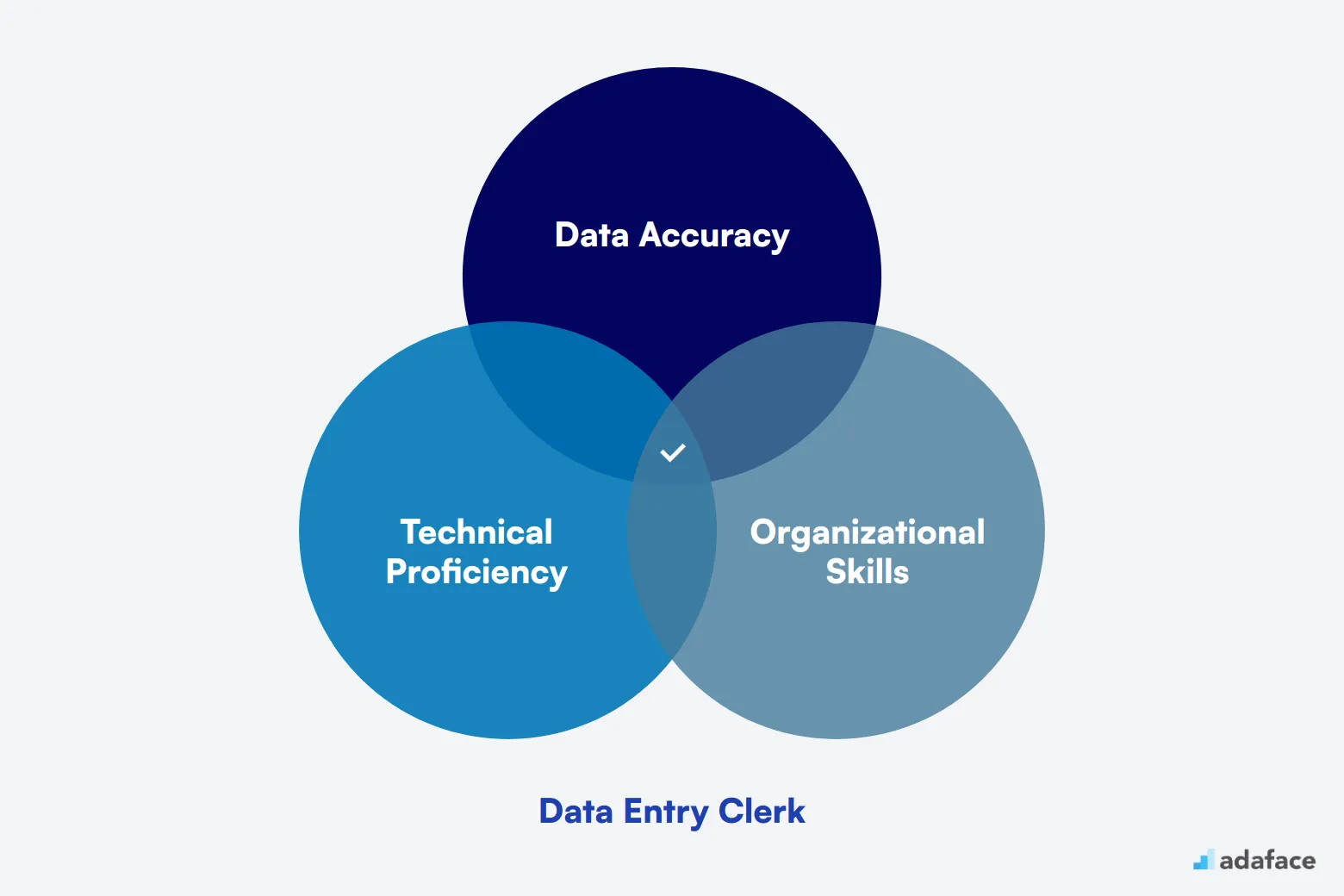
What does a Data Entry Clerk do?
A Data Entry Clerk is responsible for inputting and managing data within a company's database. They help ensure that information is accurate and easily accessible for future reference.
Day-to-day tasks of a Data Entry Clerk include:
- Entering data into computer systems or databases.
- Maintaining accurate records by verifying and correcting errors in data.
- Organizing and storing paperwork after entering data to ensure efficient access.
- Responding to requests for information and accessing relevant files for colleagues and managers.
- Converting hard copy information into a digital format.
For more details on what skills a Data Entry Clerk should possess, you can refer to this skills-required guide.
Data Entry Clerk Hiring Process
The hiring process for a Data Entry Clerk typically takes 4-6 weeks. Here's a quick overview of the timeline and steps involved:
- Create and post a detailed job description
- Review and shortlist resumes (3-5 days)
- Conduct skills assessments for typing speed and accuracy (1 week)
- Phone screenings with promising candidates (2-3 days)
- In-person or video interviews (1-2 weeks)
- Reference checks and background verification (3-5 days)
- Extend job offer and negotiate terms (2-3 days)
This process allows you to thoroughly evaluate candidates' skills and fit for the role. In the following sections, we'll dive deeper into each step, providing checklists and helpful resources to streamline your hiring process.
Skills and qualifications to look for in a Data Entry Clerk
When hiring a Data Entry Clerk, the challenge often lies in distinguishing between the necessary and the nice-to-have skills. It's easy to get overwhelmed by a long list of qualifications, but focusing on what's truly needed for your specific role is key. While a high typing speed might be a must-have, familiarity with certain industry-specific terminology could simply be a bonus.
To create a clear candidate profile, start by identifying the required skills, like proficiency in Microsoft Office Suite and an ability to maintain data accuracy. Then, consider preferred skills that could give a candidate an edge, such as experience with database management systems or bilingual abilities. This approach will help you attract candidates who not only meet your essential criteria but also bring additional value to the role.
| Required skills and qualifications | Preferred skills and qualifications |
|---|---|
| Proficiency in data entry software and Microsoft Office Suite | Associate's degree or relevant certification |
| Typing speed of at least 50 words per minute with high accuracy | Experience with database management systems |
| Excellent attention to detail and ability to maintain data confidentiality | Familiarity with industry-specific terminology |
| High school diploma or equivalent | Bilingual skills |
| Strong organizational skills and ability to meet deadlines | Knowledge of basic data analysis techniques |
How to write a Data Entry Clerk job description?
Creating an effective job description for a Data Entry Clerk is the first step in attracting the right candidates. Once you have outlined the candidate profile, it's important to capture this information succinctly in the job description.
• Highlight key responsibilities and impact: Clearly outline the daily tasks and expectations, such as data input accuracy and timely reporting. Explain how their contributions will support the overall efficiency of the organization.
• Balance technical skills with soft skills: Emphasize crucial technical skills, like proficiency in Excel or data management software, alongside soft skills such as attention to detail and communication. This balance helps attract well-rounded candidates who can adapt to the team.
• Showcase unique selling points: Mention what sets your company apart, whether it's a collaborative culture, opportunities for growth, or innovative projects. Including these details can make your job listing more appealing to prospective applicants.
For a detailed view of the responsibilities and requirements, consider reviewing a comprehensive Data Entry Clerk job description.
Top Platforms to Find Data Entry Clerks
Now that you have a well-crafted job description, it's time to post it on job listing sites to attract qualified candidates. The right platform can make a big difference in finding the perfect data entry clerk for your team. Let's explore some popular options to help you streamline your hiring process.
Indeed
Ideal for posting a wide range of data entry positions, from entry-level to experienced roles. Offers a large pool of candidates and robust search features.

LinkedIn Jobs
Best for finding skilled data entry professionals with verified work histories. Allows for targeted recruiting and networking with potential candidates.

Upwork
Excellent for hiring freelance data entry clerks for short-term projects or flexible work arrangements. Provides access to a global talent pool.

The remaining platforms offer unique advantages for different hiring needs. FlexJobs is great for remote positions, while ZipRecruiter uses AI for quick matches. Glassdoor provides company culture insights, CareerBuilder offers a diverse candidate pool, and Monster allows for detailed job listings. SimplyHired targets local talent, and Snagajob specializes in hourly positions. Choose the platform that best aligns with your specific requirements.
Keywords to Look for in Data Entry Clerk Resumes
Resume screening is a key step in finding the right Data Entry Clerk. It helps you quickly identify candidates with the most relevant skills and experience before investing time in interviews.
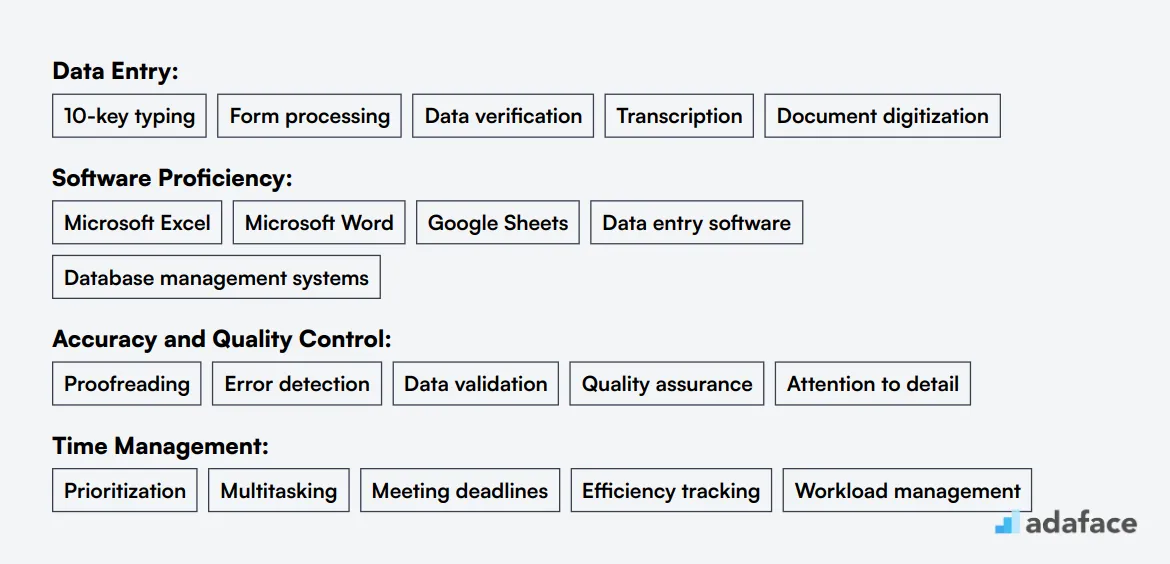
When manually screening resumes, focus on key terms like 'data entry', 'Microsoft Office', 'typing speed', and 'attention to detail'. Look for specific software proficiencies and any mention of accuracy rates or words-per-minute typing speeds.
AI tools can streamline this process. You can use ChatGPT or similar platforms by providing a prompt with your desired keywords and criteria. The AI will then analyze resumes and provide summaries based on your specifications.
Here's a sample prompt for AI resume screening:
TASK: Screen resumes for Data Entry Clerk position
INPUT: Resumes
OUTPUT: For each resume, provide:
- Name
- Email
- Matching keywords
- Score (out of 10)
- Shortlist recommendation (Yes/No/Maybe)
KEYWORDS:
- Data entry software
- Microsoft Office (Excel, Word)
- Typing speed (50+ WPM)
- Attention to detail
- Data verification
- 10-key typing
Customize this prompt based on your specific job requirements and priorities.
Recommended skills tests for Data Entry Clerks
Skills tests are a great way to evaluate Data Entry Clerk candidates beyond their resumes. These tests help assess the practical abilities needed for the role. Here are five key tests we recommend for screening Data Entry Clerks:
Data Entry Clerk Test: This comprehensive assessment evaluates candidates' ability to input data accurately and quickly. It covers various aspects of data entry, including speed, accuracy, and attention to detail.
Typing Test: A typing test measures candidates' typing speed and accuracy. This is important for Data Entry Clerks who need to input large volumes of data efficiently.
Excel Test: An Excel skills test assesses candidates' proficiency in using spreadsheets. This is useful for Data Entry Clerks who often work with Excel for data organization and basic analysis.
Attention to Detail Test: This test evaluates a candidate's ability to spot errors and inconsistencies in data. It's a key skill for ensuring data accuracy in entry tasks.
English Comprehension Test: An English comprehension assessment helps ensure candidates can understand written instructions and communicate effectively. This is important for interpreting data entry guidelines and collaborating with team members.
Structuring the Interview Stage for Data Entry Clerk Candidates
After candidates pass the initial skills tests, it's time for technical interviews to assess their hard skills more thoroughly. While skills tests are great for filtering out unqualified applicants, interviews are key to identifying the best fit for your data entry role. Let's explore some sample interview questions to help you evaluate candidates effectively.
Consider asking: 'Can you describe your experience with data entry software?' This gauges their familiarity with relevant tools. 'How do you ensure accuracy in your work?' reveals their attention to detail. 'What's your typing speed and accuracy?' helps assess a crucial skill. 'How would you handle a large volume of data with a tight deadline?' tests their time management. Lastly, 'Can you explain a time when you identified and corrected a data error?' showcases their problem-solving abilities.
Cost of Hiring a Data Entry Clerk
The cost of hiring a Data Entry Clerk varies across countries and regions. In the United States, the average salary is around $47,110 per year, with a range from $26,121 to $72,502. India offers lower rates, with an average of ₹201,355 annually, while Australia and Canada fall in between with averages of AUD 67,448 and CAD 49,000 respectively.
These figures can fluctuate based on factors like location, experience, and industry demands. Major cities generally offer higher salaries to account for increased living costs and competitive job markets.
Data Entry Clerk Salary in the United States
The average salary for a Data Entry Clerk in the United States is approximately $47,110 per year. Salaries can range from a minimum of about $26,121 to a maximum of $72,502, depending on the location and level of experience. Major cities like New York and Atlanta offer higher salary ranges, reflecting the cost of living and demand for skilled workers.
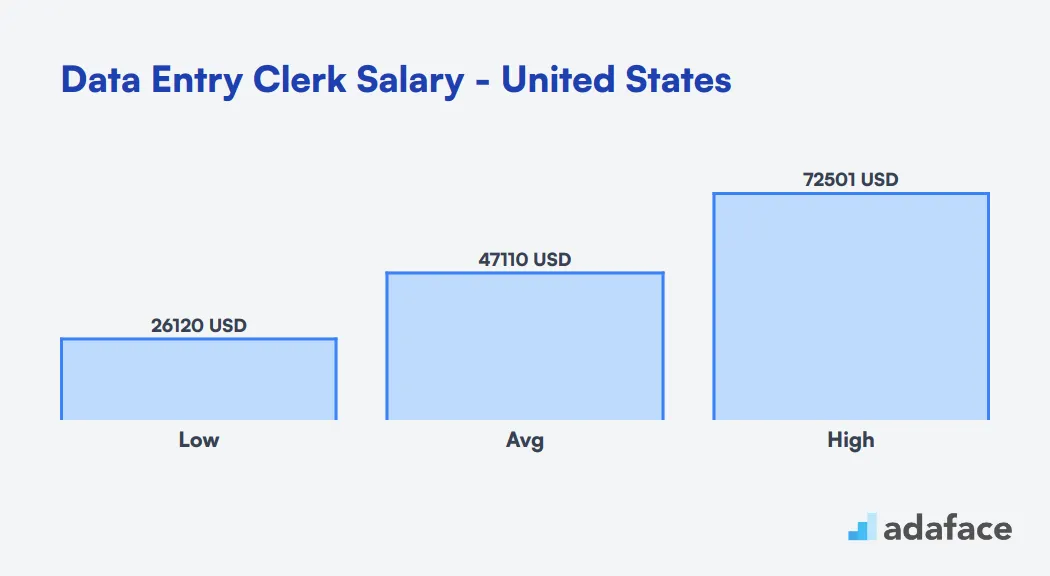
Data Entry Clerk Salary United Kingdom
In the United Kingdom, Data Entry Clerks typically earn an average salary ranging between £17,000 and £25,000 per year. While entry-level positions may start at the lower end of the scale, experienced clerks in certain sectors can earn up to £30,000 annually. Salaries can vary based on factors such as location, industry, and the individual’s level of experience.
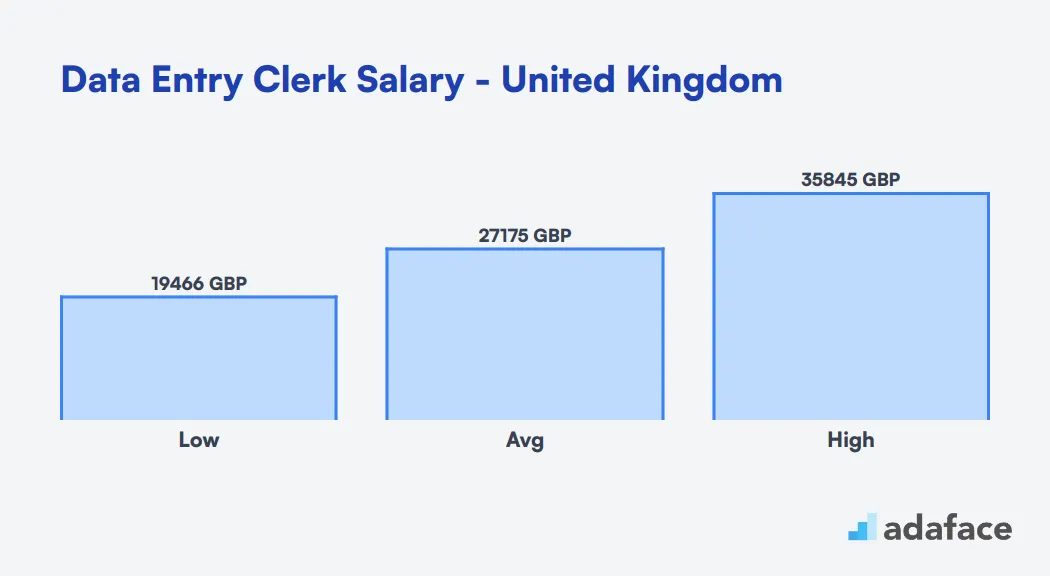
Data Entry Clerk Salary in Australia
The average salary for a Data Entry Clerk in Australia is approximately $67,448 AUD per year. Salaries can vary significantly based on location, experience, and specific industry requirements.
For instance, salaries range from around $45,701 AUD in lower-paying areas to as high as $93,641 AUD in more competitive markets. Major cities like Sydney and Melbourne typically offer better pay compared to regional locations.
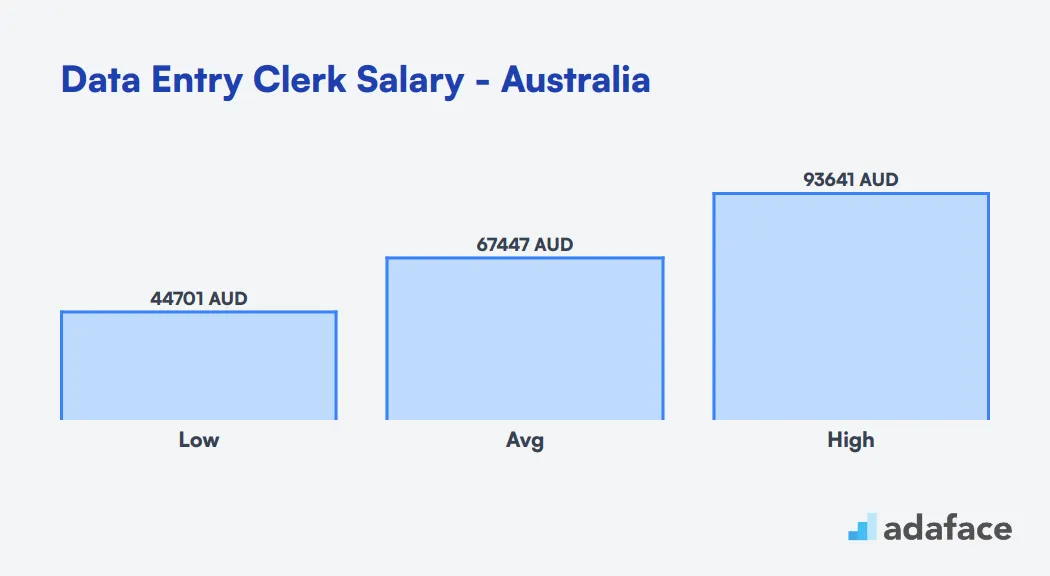
Data Entry Clerk Salary in Canada
The average salary for a Data Entry Clerk in Canada is approximately CAD 49,000. Salaries can range from a low of CAD 28,000 to a high of CAD 77,000, depending on factors like location and experience. For example, in Toronto, a Data Entry Clerk can earn a mean salary of around CAD 58,421, while in St. John's, the average drops to about CAD 36,077.
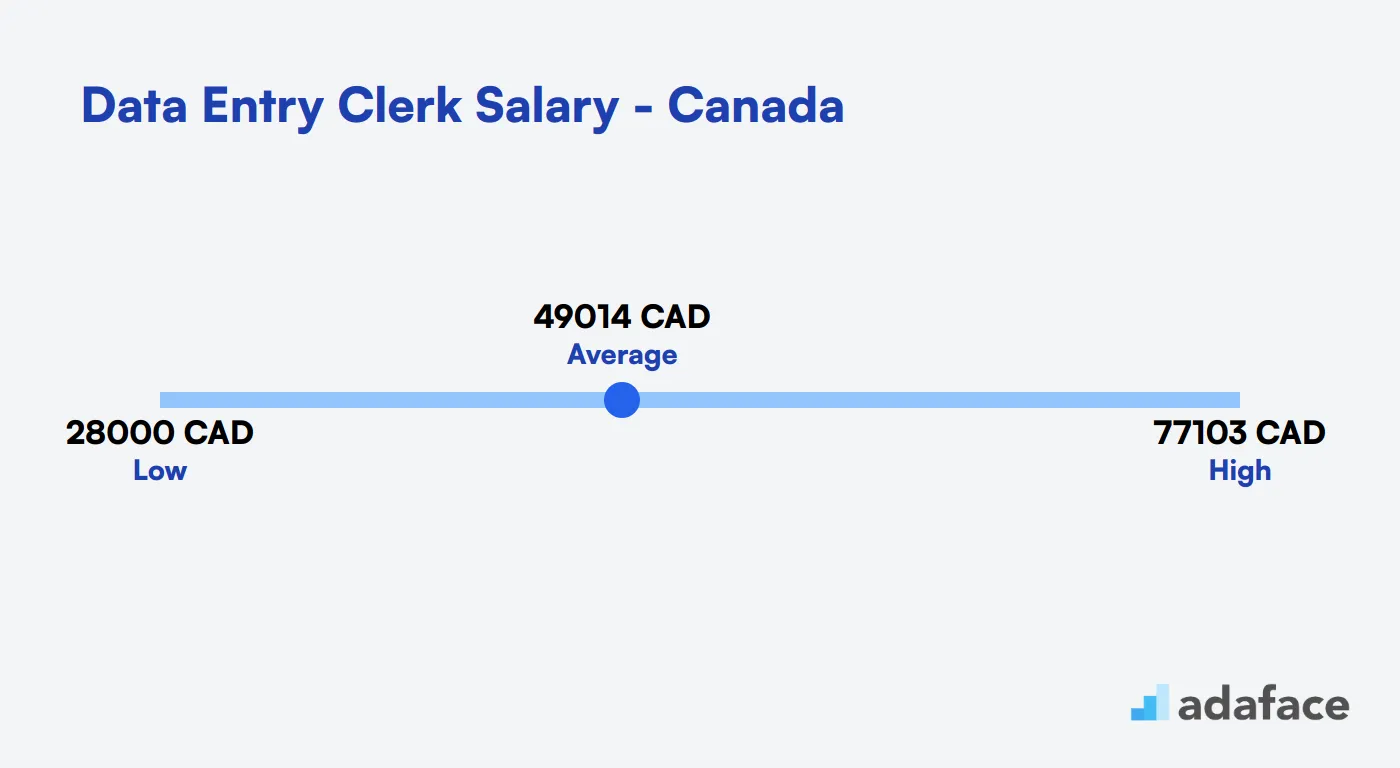
Data Entry Clerk Salary in India
The average salary for a Data Entry Clerk in India is approximately ₹201,355 per year. Salaries can vary significantly based on location, with the lowest reported salaries starting at around ₹97,502 and the highest reaching up to ₹331,180. Major cities like Kolkata, Pune, and Bengaluru typically offer competitive salaries, reflecting the demand for skilled data entry professionals.
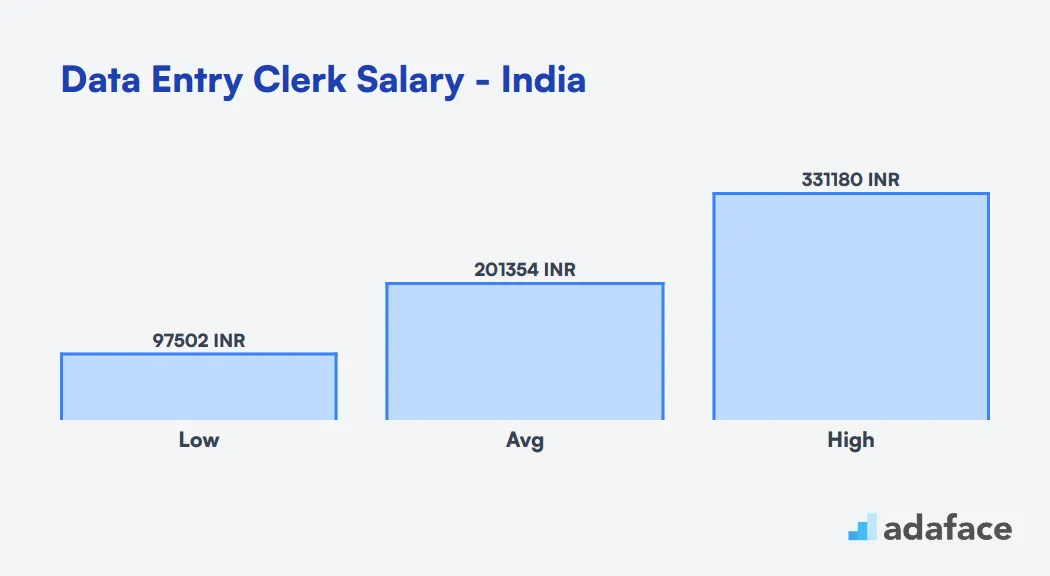
What's the difference between a Data Entry Clerk and a Data Entry Specialist?
The terms 'Data Entry Clerk' and 'Data Entry Specialist' are often used interchangeably, which can lead to confusion. However, these roles have distinct attributes that affect their responsibilities, expectations, and required skills.
A Data Entry Clerk typically holds a high school diploma and is considered an entry-level position. They are responsible for basic data input and organization, usually requiring typing speeds of 40-60 words per minute. Their focus is primarily on following established procedures for data entry and performing basic data verification tasks.
In contrast, a Data Entry Specialist generally possesses an associate's or bachelor's degree and has 2-5 years of experience in the field. They are tasked with more advanced responsibilities, such as data analysis and process improvement, and are expected to type at speeds exceeding 60 words per minute. Their role involves not only inputting data but also validating its quality and resolving discrepancies effectively.
In summary, the primary differences include:
- Education Level: Clerk - High school diploma; Specialist - Associate's or Bachelor's degree.
- Experience: Clerk - Entry-level; Specialist - 2-5 years.
- Typing Speed: Clerk - 40-60 WPM; Specialist - 60+ WPM.
- Software Proficiency: Clerk - Basic MS Office; Specialist - Advanced database management.
- Responsibilities: Clerk - Data input; Specialist - Data analysis and reporting.
| Data Entry Clerk | Data Entry Specialist | |
|---|---|---|
| Education Level | High school diploma | Associate's or Bachelor's degree |
| Experience | Entry-level | 2-5 years |
| Typing Speed | 40-60 WPM | 60+ WPM |
| Software Proficiency | Basic (MS Office) | Advanced (Database management, ERP systems) |
| Data Verification | Basic checks | Advanced validation and quality control |
| Responsibilities | Data input, basic organization | Data analysis, reporting, process improvement |
| Problem-Solving | Follow established procedures | Identify and resolve data discrepancies |
| Salary Range | Lower end | Mid to upper range |
What are the ranks of Data Entry Clerks?
Many people often confuse the different levels within the data entry field. While the job titles may sound similar, each rank comes with its own set of responsibilities and skill requirements.
- Junior Data Entry Clerk: This is an entry-level position ideal for those new to the field. Junior clerks typically handle basic data input tasks and may work under close supervision.
- Data Entry Clerk: The standard position involves more independent work. These clerks are expected to have faster typing speeds and higher accuracy rates compared to junior clerks.
- Senior Data Entry Clerk: With experience, clerks can advance to this role. Senior clerks often handle more complex data sets and may train or supervise junior staff.
- Data Entry Supervisor: This role involves overseeing a team of data entry clerks. Supervisors are responsible for quality control, workflow management, and team performance.
- Data Entry Manager: At the top of the hierarchy, managers oversee entire data entry departments. They handle strategic planning, resource allocation, and liaison with other departments or clients.
Hire the Best Data Entry Clerks
In this post, we covered the various aspects of hiring a Data Entry Clerk, from understanding their role and responsibilities to crafting an effective job description and selecting the right platforms to find candidates. By knowing the necessary skills and structuring the interview process properly, you can ensure that you bring the most capable individuals onto your team.
If there's one key takeaway from this guide, it's the importance of using accurate job descriptions and targeted skills tests to make informed hiring decisions. Implementing assessments like a Data Entry Clerk Test can aid in evaluating candidates more precisely, ensuring you hire the best fit for your organization.
Data Entry Clerk Test
FAQs
Hiring a data entry clerk is important for maintaining accurate and organized records, which is crucial for business operations and decision-making. They ensure data accuracy and help streamline data management processes.
Key skills to look for include attention to detail, fast and accurate typing, knowledge of data entry software, organizational skills, and basic understanding of data privacy regulations.
Popular platforms include job boards like Indeed and LinkedIn, freelancing websites like Upwork and Fiverr, and specialized recruitment websites. These platforms offer a range of candidates with varying levels of experience.
Utilize skills assessments such as typing tests, data accuracy exercises, and attention to detail tests to evaluate a candidate's proficiency. You can find relevant tests at Adaface's skills assessment tools.
While both roles involve data management tasks, a Data Entry Specialist typically handles more complex data tasks and may require specialized software knowledge, unlike a Data Entry Clerk who focuses on basic data entry tasks.
Focus on evaluating their attention to detail, typing speed, familiarity with data entry software, and ability to manage data accurately under time constraints. Consider incorporating practical tests to assess their competence.
Typically, a data entry clerk can progress to roles like data analyst, data coordinator, or data manager, depending on their skill development and the availability of opportunities within the organization.

40 min skill tests.
No trick questions.
Accurate shortlisting.
We make it easy for you to find the best candidates in your pipeline with a 40 min skills test.
Try for freeRelated posts
Free resources



